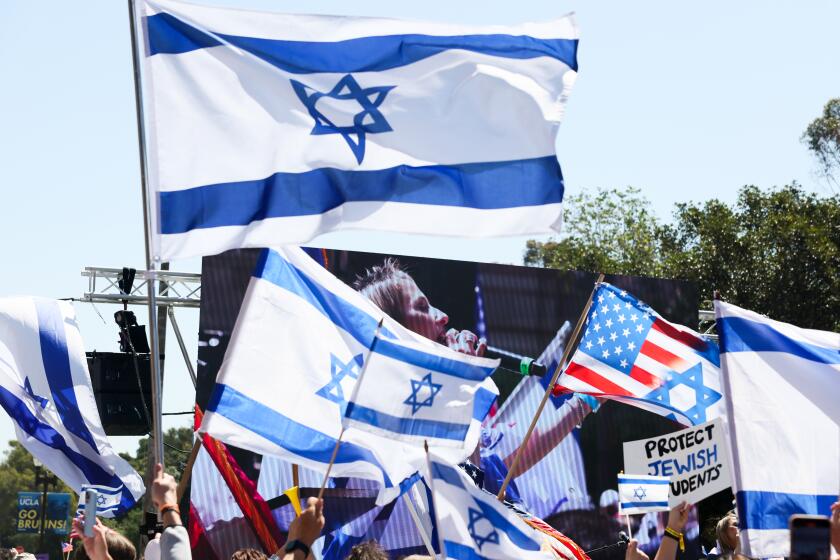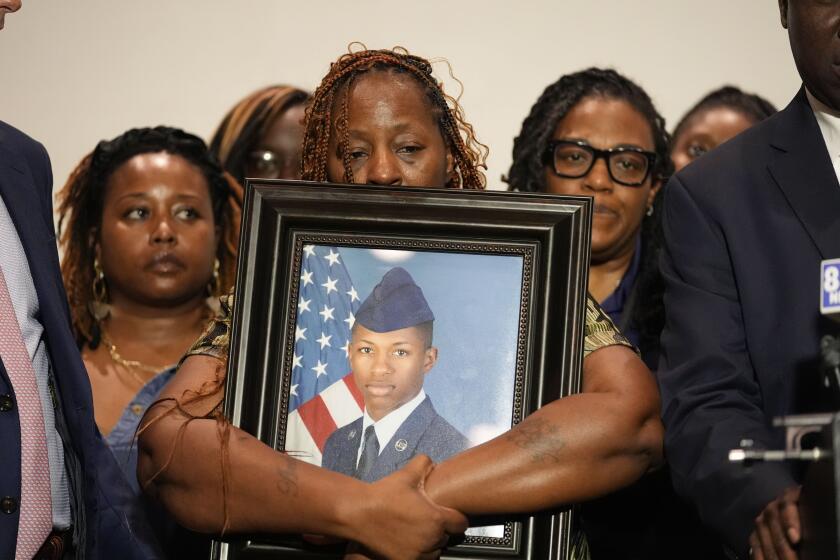Moscow Offer: All Forces Out of Central Europe
The Soviet Union, declaring the Cold War over, on Sunday stated its readiness to withdraw all of its troops from Central Europe, many of them unilaterally, in an effort to accelerate the negotiations now under way on reducing conventional forces in Europe.
In a formal government statement, the Soviet Union said that it expects to conclude agreements shortly with Czechoslovakia and Hungary on the withdrawal of its troops from those countries, that it is willing to reach a similar agreement with Poland and that it wants to speed up its pullout from East Germany.
Moscow, expressing the hope that it could withdraw all of its 555,000 troops from Europe within five years, called for the bolder moves at the negotiations in Vienna between the North Atlantic Treaty Organization and the Warsaw Pact on military cutbacks.
Noting the growing rapprochement between East and West and attempting to speed the pace of negotiations to match, the Kremlin urged other countries “not to miss this historic chance and to supplement political detente by the relaxation of tensions in the military field.”
In declaring its readiness to withdraw all its forces from Central Europe, the Soviet Union again sought to set the political and moral priorities in negotiations with the West and to overtake the recent proposal by President Bush that Moscow and Washington reduce their force levels in Central Europe to 195,000 each.
That figure is too high for Moscow to accept as a ceiling, Secretary of State James A. Baker III was told during his discussions with President Mikhail S. Gorbachev here last week, and the Soviet Union is more determined than ever to promote broad disarmament in Europe.
Moscow accepted Bush’s 195,000 limit if more than 30,000 American troops in England, Italy, Spain, Greece and Turkey are included and if negotiations are scheduled to reduce the overall number.
“The Cold War period has ended,” the Soviet Union said in its statement, “and a transition to a qualitatively new international order based on fundamentally different relationships among European states has begun.
“For the first time in the post-war period, a realistic possibility has arisen for the gradual dismantling of the outdated model of the European balance of forces that took shape over the Cold War years and was based primarily on military confrontation.
“Instead, a new system of relations is to be established to ensure stability and security on the European Continent.”
With the dramatic changes in Eastern Europe in the past six months and the more gradual improvement in relations between East and West, the Soviet Union is increasingly apprehensive that a failure to match political detente with military cutbacks could undermine the whole process.
“This task (of disarmament) becomes increasingly urgent, and there are good prerequisites for accomplishing it,” the government statement said. “Successful headway at the Vienna talks on reductions in conventional armed forces . . . is one of the main prerequisites. At the same time, there are misgivings that the results of the Vienna talks may lag behind the pace of reforms in Europe. This should not be allowed to happen.”
The Soviet fear, quite plainly, is that most of its forces will already have returned home by the time the negotiators in Vienna have worked out an agreement covering their withdrawal and that there will be a consequent pause while the United States and NATO catch up in pullouts.
The Vienna negotiations are expected to produce a first agreement this autumn on reduction of armed forces in Europe. Diplomats are now discussing a possible summit meeting, favored by both the United States and the Soviet Union, to sign the agreement and lay the basis for further talks.
Moscow’s initiative on Sunday, going significantly beyond its previous calls for arms reduction, was the first to recognize the impact on arms control of the sweeping changes in Eastern Europe, where one Communist regime after another has been forced out, and to acknowledge that the often breathtaking speed of the changes has left the diplomats far behind.
Moscow said it expects to conclude agreements, which are already under negotiation, with Czechoslovakia to withdraw its 70,000 troops there and with Hungary to pull out its 65,000 troops there this year, probably before the end of summer.
The Soviet Union said it is also prepared for similar talks with Poland, where 40,000 Soviet troops are based.
“There are all grounds to expect that these talks will end in agreement on all aspects of troop withdrawal, including the technical and social matters, and that Soviet soldiers and officers will be able to return home as quickly as possible,” the statement said.
The Soviet troops in East Germany, estimated to number 380,000, are in a different category, Moscow said, and their reduction--beyond important unilateral cutbacks already under way--must be negotiated in Vienna, perhaps in terms of the probable reunification of East and West Germany.
Although Moscow was initially pushed hard to meet the demands of Hungary and then Czechoslovakia for the withdrawal of Soviet forces, Soviet officials now speak with some enthusiasm for bringing the troops home, thus ending a much regretted chapter in Soviet foreign policy.
The major problem, Soviet officials say, is practical--how to retrain, employ, resettle and house the officers and noncommissioned officers demobilized in the cutbacks.
Roughly a fifth of those being demobilized--Gorbachev unilaterally trimmed 500,000 men from the 4.3-million-member defense forces this year--need such retraining and resettlement. But the officers coming from East Germany will be even more of a problem because they have enjoyed better housing, better supplies of food and more consumer goods there than are available at home.
If Moscow’s East European deployments were cut back to the 195,000 limit proposed by Bush and accepted in principle by Gorbachev, the troops that remained would be concentrated in East Germany--assuming that Moscow concludes the agreements it expects for the withdrawal of its forces from other Warsaw Pact countries.
More to Read
Start your day right
Sign up for Essential California for news, features and recommendations from the L.A. Times and beyond in your inbox six days a week.
You may occasionally receive promotional content from the Los Angeles Times.






